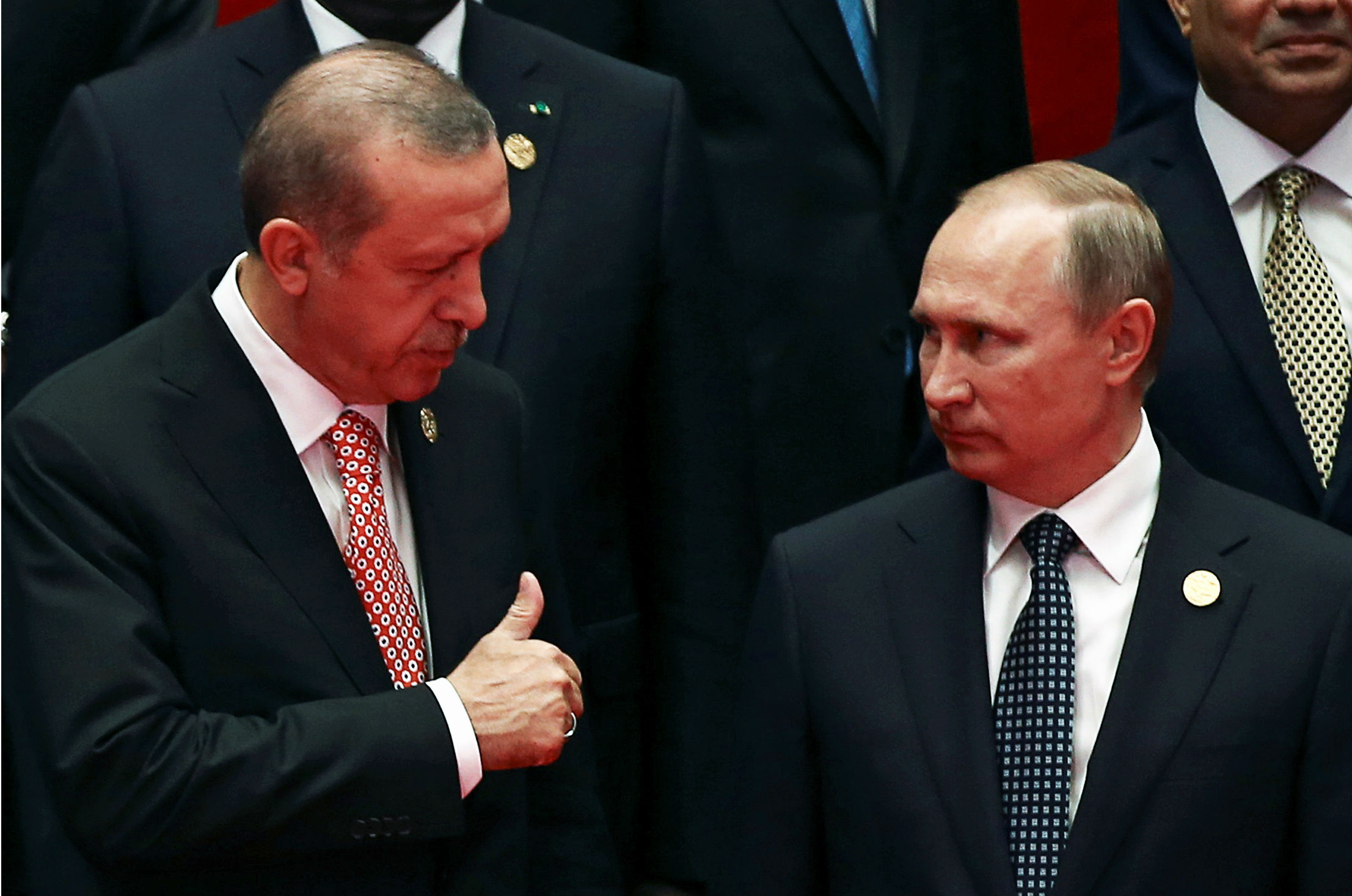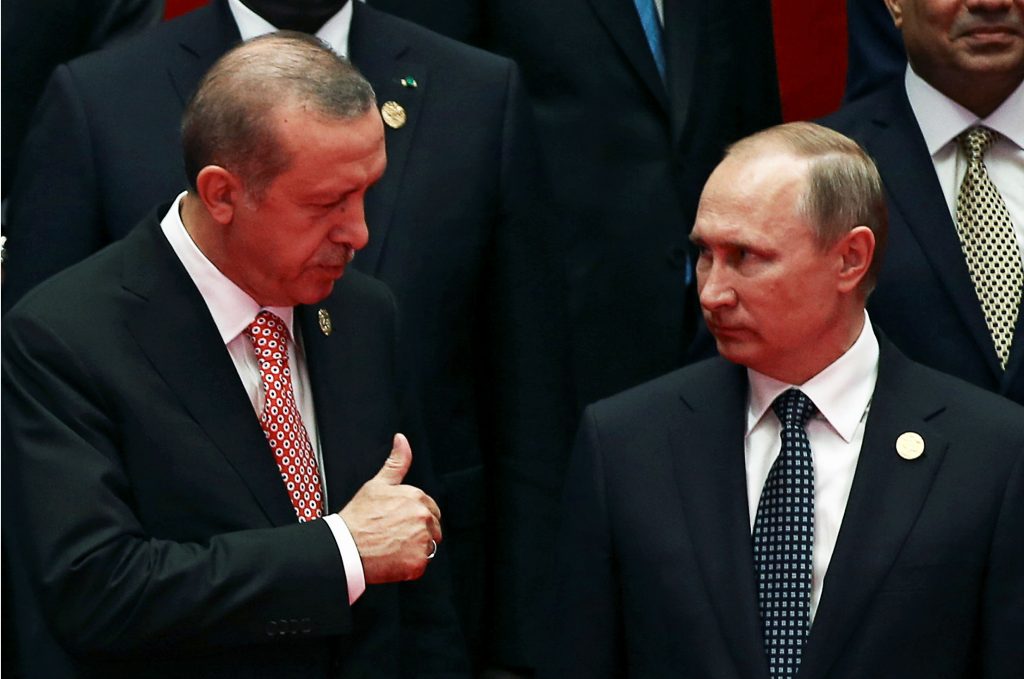 Less than six months ago, Turkish President Recep Tayyip Erdogan publicly complained that the Black Sea had become a Russian lake and sought regional and NATO cooperation against this threat. Russia and Turkey’s long-standing relationship was on the rocks, especially after Turkey had shot down a Russian fighter plane over Syria in November 2015. In its place, Ukraine and Turkey developed warmer ties and increased cooperation. But this new status quo began to change over the summer as Turkey sought to mend relations, and Putin spotted an opportunity to ingratiate himself after Turkey’s failed coup on July 15. Since then, Moscow and Ankara have reestablished relations and are cooperating deeply again. But Turkey’s rapprochement with Russia shouldn’t surprise those who study Russia’s foreign policy and its power projection.
Less than six months ago, Turkish President Recep Tayyip Erdogan publicly complained that the Black Sea had become a Russian lake and sought regional and NATO cooperation against this threat. Russia and Turkey’s long-standing relationship was on the rocks, especially after Turkey had shot down a Russian fighter plane over Syria in November 2015. In its place, Ukraine and Turkey developed warmer ties and increased cooperation. But this new status quo began to change over the summer as Turkey sought to mend relations, and Putin spotted an opportunity to ingratiate himself after Turkey’s failed coup on July 15. Since then, Moscow and Ankara have reestablished relations and are cooperating deeply again. But Turkey’s rapprochement with Russia shouldn’t surprise those who study Russia’s foreign policy and its power projection.
Since Russian President Vladimir Putin came to power in 1999, he has made partnership with Turkey a cornerstone of Russian foreign policy. But while this may be a mutually beneficial relationship for him, it is by no means an equal partnership. For Moscow, the economic goal is to increase Turkey’s dependence on Russia through trade, contracts, gas, and tourists. Politically the Kremlin aims to neutralize Turkey’s ability to carry out an independent or pro-Western program in the Caucasus and the Black Sea and to ensure that the Black Sea remains closed in wartime to NATO. A close relationship with Turkey also means that Russia can curtail an independent Turkish policy in the Middle East as a whole, and not just in Syria, if needed. Lastly, it is clearly in Moscow’s interest that Turkey dissociates itself from NATO and the West. Erdogan suffers from a bad case of Putin envy and is trying to emulate his autocratic tendencies at home.
Turkey’s dependence on Moscow was confirmed earlier this year when Erdogan restored ties on Putin’s terms. The results are impressive and far-reaching in their scope. Moscow and Ankara have resumed the effort to build a Turkstream pipeline that will isolate Ukraine from Russian gas, attempt to circumvent the EU in the Balkans, and extend Turkish dependence on Russian gas. Moscow is also building Turkey’s first nuclear plant, has offered to sell Turkey high-performance military systems, and the two states have announced that they will share intelligence about Syria and ISIS. This last point is astonishing: there are good reasons to believe that Moscow has preserved and cultivated its ties to Kurdish rebels in Turkey, including terrorists who may have been involved in operations against the Turkish state earlier this year. But this last fact underscores the continuity of Russian objectives in this part of the world that date back to the 1890s, if not earlier. Moreover, thanks to the creation of the all-encompassing military buildup in and around the Black Sea and Syria, Russian forces surround Turkey for the first time in history.
At home Erdogan has not only purged the military leadership and its officer corps since the aborted coup, he has also targeted Turkish military officers with connections to NATO and shunned real cooperation with Washington on Syria, preferring instead to fight against the Syrian Kurds because of his obsession with Turkish Kurds. This obsession plays into Moscow’s hands because it divides any potential for a united front against Bashar al-Assad in Syria and offers Moscow a magnificent instrument for pressuring and even destabilizing Turkey beyond the other instruments it now possesses. Beyond that, Moscow claims it intercepted communications launching the coup and duly warned Erdogan. That might explain Erdogan’s gratitude and the fact that Moscow quickly condemned the coup before others did. But if true, it means that Russia has long since penetrated Turkish military communications and that would have far-reaching repercussions.
Finally, by moving with alacrity to build a one party autocracy modeled on Putin’s Russia, Erdogan is also playing into the strongman’s hands. Russia wants its neighbors to emulate Putinism at home. In this context, it should surprise no one that Turkey is now demanding that the European Union terminate the agreement it made with Turkey earlier this year about refugees from the Middle East traversing the Aegean Sea or that Ankara is now making noises about territories claimed by Greece. In sum, Erdogan’s policies point to a wholesale rejection of its affiliation with the West to serve his own self-aggrandizing agenda.
But the real beneficiary of Erdogan’s actions is Putin. In this light, the current trends in the Russo-Turkish “liaison” are not only dangerous for Turkey, its neighbors, and its allies. These trends also represent a grandiose and successful manifestation of the abiding Russian employment of reflexive control tactics to induce other political actors to do what they believe is their interest while actually serving Moscow’s interests. Putin may well succeed in weakening NATO and the EU and gaining more influence in the Middle East, but when all is said and done what will Erdogan have gained?
Stephen Blank, a UkraineAlert contributor, is a Senior Fellow at the American Foreign Policy Council.
Image: Russia's President Vladimir Putin interacts with Turkey's President Tayyip Erdogan as they pose for a group picture during the G20 Summit in Hangzhou, Zhejiang province, China September 4, 2016. REUTERS/Damir Sagolj
